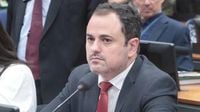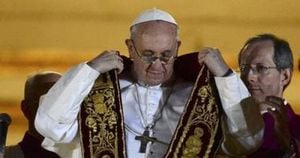On Thursday, April 17, 2025, Deputy Glauber Braga of the PSOL party from Rio de Janeiro concluded an eight-day hunger strike, a protest aimed at opposing the political motivations behind the attempt to revoke his parliamentary mandate. The decision to end the strike came after a strategic agreement was negotiated by his wife, Sâmia Bomfim (PSOL-SP), and Lindbergh Farias (PT-RJ), with the President of the Chamber, Hugo Motta (Republicanos-PB). This agreement successfully postponed the analysis of the request for his impeachment.
During a gathering in Plenary 5 of the Chamber, which saw around 30 participants from various social movements and organizations, Braga discussed the next steps regarding his situation. The meeting was crucial in rallying support and strategizing for the future. Following the discussions, Hugo Motta clarified that the case against Braga would not be brought before the Chamber's Plenary until at least 60 days after the deliberation by the Commission of Constitution and Justice (CCJ). He stated, "I guarantee that, after the deliberation of the CCJ, whatever it may be, we will not submit the case of the deputy to the Chamber's Plenary before 60 days so that he can exercise his defense of his parliamentary mandate. After this period, the deputies will be able to decide on the process sovereignly."
Braga, who has consistently denounced the political motivations behind the impeachment process, expressed his gratitude for the support he received during his hunger strike. He emphasized that, while he was suspending the hunger strike, he would not relent in his fight against what he termed the "Secret Budget," a controversial financial practice in Brazilian politics. In a statement to the press, he remarked, "The suspension of the hunger strike comes from a message that demonstrated, through all this solidarity, a retreat, an important signal against the persecution that was being carried out here."
Throughout the hunger strike, which lasted over 200 hours, Braga lost more than five kilograms. His food intake was limited to water, serum, and isotonic drinks, and he received only restricted visits from supporters and politicians. Following the end of the strike, he was advised to visit a hospital for a health checkup and to begin the transition back to a regular diet under medical supervision.
Braga's hunger strike began on April 9, 2025, after the Ethics Council approved a report recommending his impeachment. This move sparked significant public attention and debate, with many viewing it as an attack on political dissent. The political landscape surrounding his case is fraught with tension, as Braga has argued that the impeachment process is rooted in his vocal opposition to the government's fiscal policies, particularly concerning the Secret Budget.
The implications of this situation extend beyond Braga himself. His case has become a symbol of the ongoing struggles faced by politicians who challenge the status quo in Brazilian politics. The support he garnered during his hunger strike indicates a growing discontent among segments of the population regarding how political power is wielded and the mechanisms used to silence dissent.
As Braga shifts his focus from protest to defense, he remains committed to advocating for transparency and accountability in government spending. He stated, "I am suspending the hunger strike, but we are not suspending the fight against the Secret Budget. The hunger strike fulfilled its role: it amplified the denunciation of political persecution, contributed to popular pressure in the streets and networks, and generated solidarity for a cause."
The political maneuvering surrounding Braga's case underscores the complexities of Brazilian politics, where issues of governance, ethics, and public accountability are often intertwined. With the agreement reached to delay the impeachment process, it remains to be seen how this will play out in the coming weeks and what it means for the broader political climate in Brazil.
As the situation develops, it is clear that the implications of this case will resonate beyond the walls of the Chamber. The public's reaction and ongoing discussions about the Secret Budget and political accountability will likely shape the narrative moving forward.





